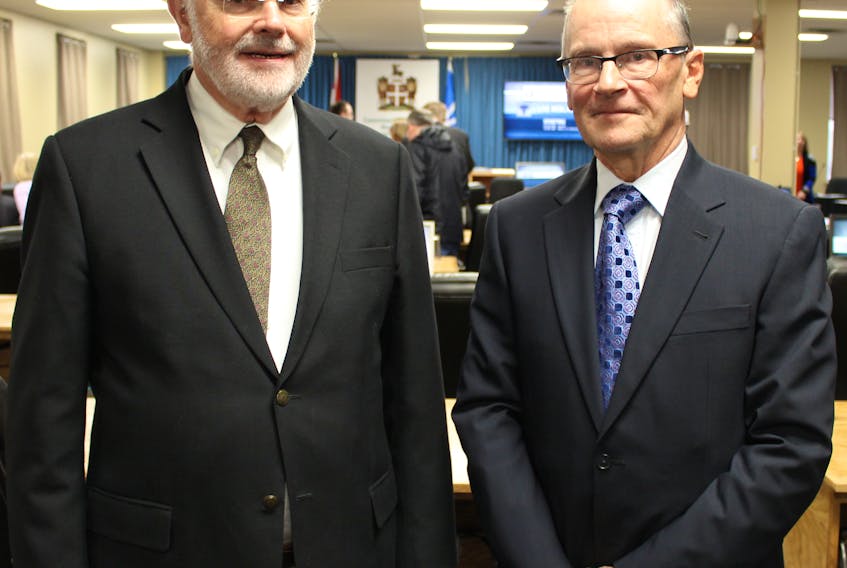If you ever sit back and wonder how it was that the Muskrat Falls project happened, you need only look to the present.

Testimony given at the public inquiry so far is reflecting in microcosm what played out in macrocosm between the time Muskrat Falls was proposed to the point of sanction and in the years immediately afterward when costs spiked catastrophically.
Former premier Danny Williams gave impassioned testimony last week about how, at the time the Muskrat Falls project was conceptualized, he felt Quebec was constantly erecting roadblocks to this province’s energy plans and was fed up and frustrated.
It was an “us” versus “them” moment, The Telegram’s Ashley Fitzpatrick reported. Those for and against Muskrat Falls were — and still are — polarized.
This week, witnesses David Vardy and Ron Penney of the Muskrat Falls Concerned Citizens Coalition were peppered with questions from lawyers for the Tory government members who saw Muskrat Falls through, in an attempt to show that they lacked the expertise required to criticize the project or offer alternatives — or that they had been predisposed to argue against it from the start.
It was an “us” versus “them” moment, The Telegram’s Ashley Fitzpatrick reported. Those for and against Muskrat Falls were — and still are — polarized.
It’s a situation that occurs often with public megaprojects, Bent Flyvbjerg notes in “Megaprojects and Risk,” because ordinary citizens are shut out of the process and politicians wield all the power.
Concerned citizens in Newfoundland and Labrador could object all they wanted, but they were in no position to change anything.
Even now, former premier Williams dismisses critics of the project as “bottom-feeders.”
And even though Vardy and Penney both have considerable senior-level experience in the public service and knowledge of the workings of government, Williams told reporters the inquiry commissioner should give little weight to their testimony, calling it “basically insignificant.”
“They’re criticizing for the sake of criticizing, and nobody is safe from that,” he said.
Vardy and Penney were given standing at the inquiry in order to outline why they opposed Muskrat Falls — opposition they shared with other credible and articulate members of the public, just as representatives of indigenous and environmental groups in Labrador expressed their concerns about the project’s ramifications for the land, and animal and human health.
And yet Vardy and Penney were grilled like burgers at a barbecue fundraiser; it was suggested that they were a bit long in the tooth to be offering any meaningful criticism. Penney was questioned doggedly about his connections to former Public Utilities Board commissioner Andy Wells — who now calls Muskrat Falls “a mistake” — and to former premier Brian Peckford, who called for a forensic audit of the project.
The questioning seemed unduly harsh at times.
Now, it’s easy to get caught up in the drama and disparagement. But let’s pull ourselves back for a moment and consider the inquiry’s terms of reference.
Justice Richard LeBlanc has been asked to essentially determine:
- Whether Nalcor considered all possible options and alternatives to Muskrat Falls.
- How the cost of the project went from roughly $6.1 billion to $12.7 billion.
- Whether exempting the project from the oversight of the Public Utilities Board was reasonable or detrimental.
- Whether the government was fully informed and aware of the risks.
Nowhere in those terms of reference does it say the inquiry is meant to prove any and all criticism of the project was baseless. Nor is it meant to provide a forum for chastising citizens who were brave enough to stand up in front of the Muskrat Falls machine that was barrelling towards us all and say, “Wait a minute. What if…?”
Was some of the criticism unfounded? We’ll have to wait and see. No one in a decision-making position seemed to give it any weight anyway.
But we live in a democracy, which means people who care enough about the public good to ask questions and challenge assumptions are to be applauded, not torn down.
Dismissing concerned citizens as being past their prime or as bottom-feeders is insulting and distracts from the inquiry’s true mandate.
So, ignore the smoke and mirrors. Don’t be distracted. Keep your eyes and ears open. There’s plenty more to come.
Pam Frampton is a columnist whose work is published in The Western Star and The Telegram. Email [email protected]. Twitter: pam_frampton
Recent columns by this author









